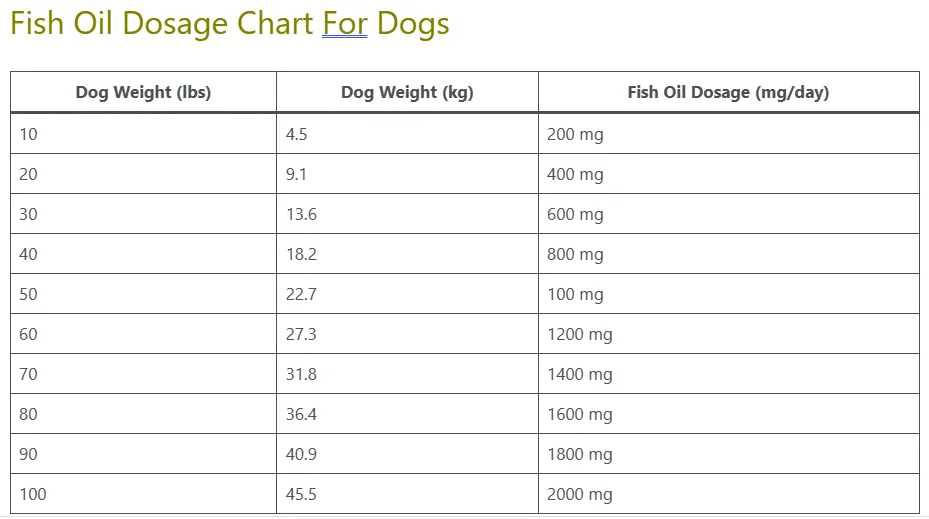Fish oil is a popular supplement known for its numerous health benefits, not only for humans but also for our furry companions. When it comes to our beloved dogs, fish oil can be a valuable addition to their diet, providing essential omega-3 fatty acids that contribute to overall well-being.
Understanding the proper dosage of fish oil for dogs is crucial to ensure they receive the maximum benefits without any adverse effects.
Fish Oil Dosage For Dogs
The ideal dosage of fish oil for dogs ranges from 20 to 55 milligrams of EPA (eicosapentaenoic acid) and DHA (docosahexaenoic acid) per pound of body weight per day, or 9 to 24 milligrams per kilogram of body weight per day.
- Small dogs (up to 20 pounds): Start with around 100-250 mg of combined EPA and DHA per day.
- Medium-sized dogs (20-50 pounds): Provide around 250-500 mg of combined EPA and DHA per day.
- Large dogs (50-75 pounds): Offer around 500-750 mg of combined EPA and DHA per day.
- Extra-large dogs (75 pounds and above): Aim for approximately 750-1000 mg of combined EPA and DHA per day.
It’s important to note that these are general recommendations, and consulting with a veterinarian before starting any supplement regimen for your dog is advisable.
The vet can provide personalized advice based on your dog’s specific needs and health status. Always choose high-quality fish oil supplements specifically formulated for dogs to ensure safety and efficacy.
Fish Oil Dosage Chart For Dogs
| Dog Weight (lbs) | Dog Weight (kg) | Fish Oil Dosage (mg/day) |
|---|---|---|
| 10 | 4.5 | 200 mg |
| 20 | 9.1 | 400 mg |
| 30 | 13.6 | 600 mg |
| 40 | 18.2 | 800 mg |
| 50 | 22.7 | 100 mg |
| 60 | 27.3 | 1200 mg |
| 70 | 31.8 | 1400 mg |
| 80 | 36.4 | 1600 mg |
| 90 | 40.9 | 1800 mg |
| 100 | 45.5 | 2000 mg |
The above dosage of fish oil for canines may need adjustment based on individual factors. It’s crucial to start with a lower dose and gradually increase it while monitoring your dog’s response.
Types of Fish Oil for Dogs
Fish oil supplements for dogs are available in various forms, including liquid, capsules, and soft gels. Additionally, there are different sources of fish oil, such as salmon, cod liver, and krill oil.
Each type has its unique composition and benefits. Choosing the right option for your dog involves considering factors like taste preferences, potential allergies, and overall effectiveness.
Health Benefits of Fish Oil for Dogs
Fish oil offers a multitude of health benefits for dogs. The omega-3 fatty acids EPA and DHA found in fish oil are essential for promoting healthy skin and coat, reducing inflammation, and supporting joint health.
Fish oil has been linked to improved heart health and cognitive function in dogs, making it a valuable supplement for overall wellness.
Potential Side Effects
While fish oil is generally safe for dogs, there are potential side effects to be aware of. Common side effects may include gastrointestinal upset, diarrhea, or vomiting, especially if the dosage is too high.
Monitoring your dog closely for any adverse reactions can help mitigate these side effects.
Choosing high-quality supplements and ensuring freshness can minimize the risk of adverse effects.
Related Post: Benadryl Dosage Calculator For Dogs
Tips for Administering Fish Oil
Administering fish oil to your dog can be easy and hassle-free with a few simple tips. Mixing the oil with their food or using flavored supplements can help mask any unpleasant taste.
It’s also essential to store fish oil properly to maintain its freshness and effectiveness. Regularly checking for expiration dates and storing the supplements in a cool, dark place can ensure optimal quality.
Which Dogs Should Not Take Fish Oil?
- Dogs with known allergies to fish or seafood may react adversely to fish oil supplements.
- Dogs with a history of pancreatitis or those prone to this condition may not tolerate the high-fat content of fish oil well.
- Fish oil can interfere with blood clotting, so dogs with bleeding disorders or those on blood-thinning medications should avoid fish oil or use it under strict veterinary guidance.
- Excessive intake of fish oil, which contains vitamin A, can lead to hypervitaminosis A, causing toxicity symptoms. Canines already receiving vitamin A supplements or with underlying health conditions sensitive to vitamin A levels should avoid fish oil.
- Fish oil may affect insulin sensitivity, so diabetic dogs should only take fish oil under veterinary supervision to monitor blood glucose levels.
Importance of Consulting with a Veterinarian
Before adding fish oil or any supplement to your dog’s diet, it’s crucial to consult with your veterinarian. They can provide personalized recommendations based on your dog’s health status and specific needs.
Your veterinarian can also help determine the appropriate dosage and frequency of supplementation, ensuring your dog receives the maximum benefits with minimal risk.
Related Post: Cephalexin For Dogs Dosage Chart
FAQs:
Can I give my dog fish oil every day?
Yes, fish oil can be given daily, but it’s essential to follow recommended dosages and monitor for any adverse effects.
How long does it take for fish oil to work in dogs?
The effects of fish oil can vary depending on the individual dog and their health condition. Some dogs may show improvement within a few weeks, while others may take longer.
Can I give my dog fish oil if they have allergies?
It’s essential to consult with your veterinarian before giving fish oil to a dog with allergies, as certain types of fish oil may exacerbate allergic reactions.
Are there any alternatives to fish oil for dogs?
Yes, there are alternative sources of omega-3 fatty acids for dogs, such as flaxseed oil or algae-based supplements. However, these may not be as readily absorbed or as effective as fish oil.
What should I do if my dog experiences side effects from fish oil?
If your dog experiences any adverse reactions to fish oil, such as vomiting or diarrhea, discontinue use and consult with your veterinarian for further guidance.
Final Thoughts: Fish Oil For Dogs
Incorporating fish oil into your dog’s diet can offer numerous health benefits, from promoting shiny coats to supporting joint health and overall vitality. By understanding the proper dosage and administration techniques, you can ensure your furry friend enjoys the full advantages of this valuable supplement.
Remember to consult with your veterinarian to tailor the dosage according to your dog’s individual needs and monitor for any adverse effects.





![Can Dogs Eat Blood? 7 Side Effects [Expert Opinion]](https://petskor.com/wp-content/uploads/2022/04/Webp.net-resizeimage-12.jpg)
